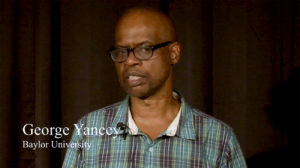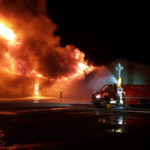No Need Among You conference speakers challenged online participants to interpret societal systems and Scripture from the perspective of the marginalized.
The annual conference, sponsored by the Texas Christian Community Development Network, originally was scheduled as a three-day event in Fort Worth but transitioned to a virtual experience due to the COVID-19 pandemic.
Pandemic offered ‘unveiling’
If Christians want to see Martin Luther King’s vision of the Beloved Community become reality in the midst of a catastrophic time, they must listen to “the voices of the poor and marginalized,” said Jonathan Wilson-Hartgrove, director of the Rutba House School for Conversion in Durham, N.C.
The COVID-19 pandemic and the death of George Floyd while in police custody provided an “unveiling” that gave middle-class white Americans a glimpse into harsh realities about inequality and racial division, Wilson-Hartgrove said.

But white Christians could have learned the truth earlier if they had listened to people living at the margins—individuals and families who live paycheck-to-paycheck, knowing a $400 emergency would plunge them into crisis, he asserted.
“Even before the pandemic, there was a deep divide—a divide that is marked by our history of racial inequality (and) that’s marked by a gender pay gap,” said Wilson-Hartgrove, a leader in the Poor People’s Campaign and its call for “moral revival.”
The “uprising for racial justice” during the summer was triggered not only by the graphic video of a police officer with his knee on the neck of an African American man, but also by the awareness of unequal suffering the pandemic brought into focus, he continued.
“It has happened in a moment when so many of us are aware of the pain that so many people feel and are aware that the pain is not spread equally among people in our society,” Wilson-Hartgrove said.
“This has revealed the ‘two Americas’ in a stark and new way,” he continued, referring to a longstanding observation about the “have” and “have-nots” in the United States.
Sign up for our weekly edition and get all our headlines in your inbox on Thursdays
‘Rot at the core of our society’
The convergence of the pandemic and a flagrant example of police brutality created “a catastrophe that reveals the rot at the core of our society,” he said.
 Wilson-Hartgrove noted his experience living in intentional community—sometimes called “New Monasticism”—led him to discover wisdom from Benedictine monks.
Wilson-Hartgrove noted his experience living in intentional community—sometimes called “New Monasticism”—led him to discover wisdom from Benedictine monks.
He particularly pointed to the teachings of St. Benedict of Nursia, who emphasized life in community must be centered on shared principles, not just shared practices.
“The Beloved Community, if it is going to grow into the fullness of who Jesus is and what God has revealed to us in Jesus Christ, must constantly be centering the voices of those who have been most marginalized,” Wilson-Hartgrove said.
Bethany Rivera Molinar, president of the Texas Christian Community Development Network and operations director of Ciudad Nueva in El Paso, challenged online conference participants to consider the lenses through which they interpret Scripture.
“The way we have been shaped and taught to understand Scripture historically and on into today has been to protect those in power,” Molinar observed.
Just as slaveholders used the Bible to justify chattel slavery, many today water down Jesus’ warnings about wealth and the blessings he pronounced on the poor, while unconditionally applying Paul’s teachings about obedience to civil authority in Romans 13, she asserted.
“Scripture is still used to justify unjust actions toward our neighbors,” Molinar said. “The way we read Scripture shapes the way we look at our neighbors and the way we walk with our neighbors.”
Read the Bible from the margins
When interpreting the Bible, she encouraged Christians to ask:
- What voices in Scripture do we give greater weight to?
- How do we read ourselves into Scripture?
- What characters are we drawn to?
- With whom do we read Scripture?
- Whose sermons, podcasts, books and blogs shape our theology?
- What is our posture toward theology outside the white Western male majority perspective?
She pointed to the story of Hagar in Genesis 16 and 21. Rather than looking at her as peripheral to the larger story of Abram and Sarai, she encouraged readers to explore how God met Hagar where she was, called her by name, opened her eyes to possibilities in front of her and affirmed her dignity.
She encouraged readers to look for themes in biblical stories that echo principles of Christian community development, such as listening, meeting people where they are, empowerment and recognizing the Holy Spirit already is active in every community.
“What voices shape the trunk of your theological tree?” she asked.
Confront corporate societal sin
Soong-Chan Rah, professor of church growth and evangelism at North Park Theological Seminary, encouraged Christians to “tell the stories of those who have been silenced in the past.”

He emphasized the reality of inherent sin in social systems, because sinful individuals shape systems and structures.
“The values of the social system reflect the externalized values of individuals—good and bad,” he said.
In time, the institution takes on a life of its own, because it outlives the individuals who developed it, he said. But it continues to be infected by inherent sin and to produce individuals within the system who are shaped by its values.
“We must address sin and evil in both its individual and its corporate expressions,” he said. “Addressing evil requires knowing the geography of evil.”
Rather than unquestioningly accepting societal narratives that favor the powerful, the church is called to live as God’s covenant community and to tell the stories of the vulnerable, he insisted.
Looking at the early church in the New Testament book of Acts, he pointed to a cause and effect relationship between self-sacrifice and numerical growth.
“The self-sacrificial living of the church was the cause. Church growth and evangelism was the effect,” he said. “The church preached the gospel and demonstrated the gospel. They exemplified the kingdom of God by speaking it and living it.”
Feel good or do good?
George Yancey, professor of sociology at Baylor University, urged Christian activists to examine critically whether their actions are designed to make them “feel good” or whether they actually “do good” in lasting and sustainable ways.
For example, he pointed to research that indicates well-meaning programs such as mandatory diversity training actually can be counterproductive in terms of increasing the number of Black, Hispanic and Asian individuals in workplace leadership positions. In contrast, voluntary diversity training and mentorship programs show lasting benefits.

“Forced compliance tends to backfire,” he said. It may cause temporary improvement, but it seldom results in lasting change.
“Solutions built with the input of everyone are going to be more effective and more sustainable,” he said.
Yancey encouraged Christians to practice “active listening”—spending time with people who hold different viewpoints and listening until it is possible to restate their position in a way they can recognize and affirm.
“Bringing people into the conversation can produce great results,” he noted. “Understanding the perspective of those who do not support you can help you gain their support. Work with people where they are, not where you want them to be.”














We seek to connect God’s story and God’s people around the world. To learn more about God’s story, click here.
Send comments and feedback to Eric Black, our editor. For comments to be published, please specify “letter to the editor.” Maximum length for publication is 300 words.